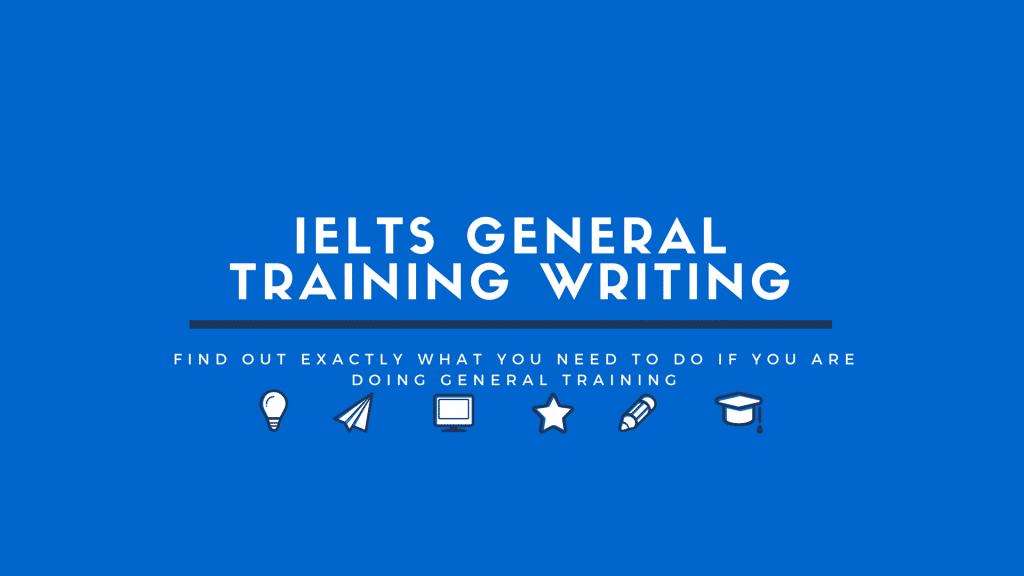This article will show you the differences between IELTS General Writing and IELTS Academic Writing and also show you exactly where to find all the help you need for your General Training Writing test.
Writing is comprised of two tasks:
- Task 1
- Task 2
There are big differences between the General Training and Academic. However, some things are exactly the same. Let’s look at the similarities first.
Let’s look at the similarities first.
IELTS General Writing vs Academic: Similarities
For both, you have to do Task 1 and Task 2 in one hour.
Task 2 is the same for both. The examiners will be judging you on the exact same marking criteria and the type of questions you get will be the same.
Basically, it doesn’t matter what test you are doing. If you see ‘Task 2’ then it is applicable to you.
For all the free help you will need for Task 2, please check out our Task 2 page.
IELTS General Writing vs Academic: Differences
The major difference is Task 1. For General Training Writing, you will always be asked to write a letter.
For Academic Writing, you will never be asked to write a letter. If you are doing Academic, please check out our Task 1 Academic resources because the following does not apply to you.
IELTS General Writing: Task 1
There are two possible letters they will ask you to write:
- A formal letter
- An informal letter
There are lots of teachers and websites that talk about ‘semi-formal’ letters. You do not have to worry about these. Do not over-complicate things by studying a third type of letter, formal and informal are all you need.
IELTS General Writing: Strategy
The General Training Task 1 test always follows the same format. You will be given the scenario and then asked to write about three bullet points.
This is a typical General Training Task 1 format:
Scenario
Write a letter to [X]. You should include:
- Bullet point 1
- Bullet point 2
- Bullet point 3
For example:
You live in a room in college which you share with another student. However, there are many problems with this arrangement and you find it very difficult to work.
Write a letter to the accommodation officer at the college. In the letter,
• describe the situation
• explain your problems and why it is difficult to work
• say what kind of accommodation you would prefer
This predictable format allows us to follow a strategy that ensures we cover all of the various points and that we answer the question.
The strategy is as follows:
Dear [X]
Paragraph 1- State purpose of the letter
Paragraph 2- First bullet point
Paragraph 3- Second bullet point
Paragraph 4- Third bullet point
Sign off
Your name
You should aim to write around 50 words for each of the bullet points to ensure you develop your main ideas sufficiently. Be careful to stick to the main points and do not write about unnecessary details.
You can use this strategy for any IELTS General Writing question. However, you do need to be aware of the tone you need to use.
Check out this link for more info. on this strategy.
IELTS General Writing: Formal or Informal?
There is a very simple way to tell if you are supposed to write a formal or informal letter- the word ‘friend’.
If they ask you to write to a ‘friend’, it is always an informal letter.
If the question asks you to write to anyone else, it is a formal letter.
This is the simplest thing you will ever have to do on your IELTS test, just look for the word ‘friend’.
Despite making it simple for you, every time I give this advice people always ask ‘What if….’ questions. You are probably thinking of one right now. Stop! Follow the simple advice above and you will be fine.
IELTS General Writing: How to Write a Formal Letter
The main thing you need to consider here is the type of formal language, or tone, you will have to use.
I have created this article on formal letters to help you.
IELTS General Writing: How to Write an Informal Letter
Again, you need to be aware of and know how to use informal language to ensure the right tone.
I have also created an article on informal letters to help you out.
IELTS General Training Writing: Top Six Mistakes
Next Steps
If you need any more help with your IELTS Writing, feel free to head over to our Facebook page and ask a question. Be sure to like our page and receive updates on all our new articles, videos and more.
The key is to not just read the above information and do nothing about it. You have to implement what you have learned through practice.
You will find some Task 1 General Training practice questions at the links below:

